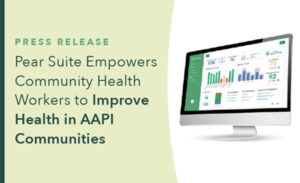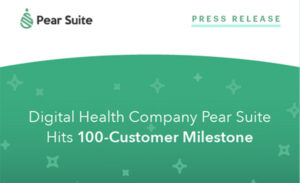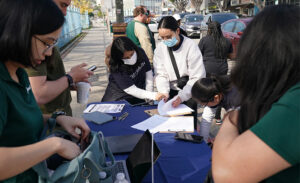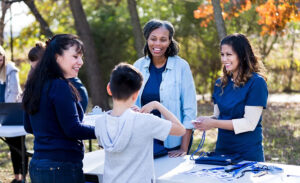A team of founders with experience in aging, healthcare operations, and tech joined forces to build a SaaS platform that moves organizations from reactionary healthcare to proactive wellness.
Challenge
Healthcare for seniors has a serious numbers problem. According to a report by the National Academy of Medicine, 90% of the money spent on healthcare for older patients is used for medical services that respond to disease and injuries as they occur. The problem is that all of that spending only drives an estimated 10% in improved outcomes. In other words, the vast majority of our spending on senior healthcare is spent on the tip of the iceberg and ignores the massive areas of life that actually drive healthy outcomes. These are things like neighborhoods and living environments, transportation, access to care, access to healthy food options, relationships, community, and economic stability. These are known as the social determinants of health (SDoH), and while their importance is now widely acknowledged and researched, the healthcare system’s ‘diagnose, then treat’ cycle is not currently built to address them.
When it comes to older patients, that paradigm needs to change, and quickly. The population of people over the age of 65 in the US is set to rise from its current number of 54 million to 80.8 million by 2040 and the national caregiver shortage continues to worsen. Not only that, but as the pandemic both revealed and exacerbated, there is a severe loneliness and social isolation problem, especially among older adults. There are significant links between loneliness and negative health implications, such as a recent study that found social isolation and loneliness increased the risk of heart disease in older women by as much as 27%. Another longitudinal study estimated that the health impact of poor social relations was equivalent to smoking 15 cigarettes a day. Realistic solutions for healthy aging need to consider social connectedness even as they attempt to solve for the problem of staff shortages and a rapidly growing number of older Americans.
Thankfully, a dedicated team of entrepreneurs is leveraging technology to tackle these issues, helping senior-serving health and community organizations address SDoH issues in intuitive ways so that seniors can thrive as they age.
Origin Story
Colby Takeda was just 25 years old when he became the administrator of a newly-opened assisted living facility in Hawaii. All of a sudden, the care and wellbeing of 150 residents was in his hands. His to-do list was daunting — hiring and training staff (including a nursing team), developing nutritious meal programs, planning fun activities, making sure people stayed engaged and healthy — in short, creating a place where the residents could thrive and age gracefully. Takeda, who studied public health and exercise science, wanted more for his residents than a reactionary approach to their health that only responded to sickness. He wanted to create an environment that proactively promoted wellness.
To that end, he helped his company as a champion of new technologies. He was one of the first users of the platform Sagely, which helped to manage activities. The entire network of communities transitioned from paper to electronic medical records (EMR). He made sure the entire building had wifi (making theirs the first facility in the chain to do so), helped his residents understand how to connect with family over Facetime, and hosted digital photography classes.
Following this formative experience, Takeda flipped to the other side of the aging coin and worked for The Blue Zones Project by Sharecare, helping over 60 communities across the country implement changes that make the healthy choice the easy choice for residents as they age. Takeda ran the policy and strategic partnerships for the Project, exploring strategies and techniques to make the places where people live, work, pray, play and learn healthier, enabling people to not only age in place but thrive as they did so.
Seeing these two sides of the aging coin up close (long-term care and aging in place), provided Takeda with a clear picture of what was broken in how society thinks about health as people age. Takeda began to imagine a product that could help move the needle on social drivers of health while reducing the load on the already burdened healthcare workers in the aging field. What was needed, he thought, was a simple solution for addressing these SDoH that was actionable, scalable, and affordable. The seeds for Pear Suite were sown.
But Takeda couldn’t do it alone. Through a mutual friend and colleague, he met Lee Colburn, who serves as CPO. Colburn, a former Army officer who served in Afghanistan, worked as an executive consultant for Kaiser Permanente, and thoroughly understands healthcare operations and the importance of leveraging data in care coordination. Next they brought in Nick Lockett as CTO. Lockett added years of experience in data, artificial intelligence, and voice analytics, both at large companies like Microsoft and several other startups.
“We’re doers,” Takeda emphasized, when asked what made this founding team work. “We get the job done no matter what. We have different backgrounds — aging, finance, analytics, operations, technology — but we each have our own story of why older adults matter to us.”
While many technology companies start with the technology and try to find a market, Pear Suite took the opposite approach. The founders talked about the real problems they personally encountered in the healthcare industry and imagined the tool they wished they had. They utilized their connections at the University of Hawaii to test their ideas, taking advantage of several startup launchpads at the college to identify market opportunities and needs, and do proper customer discovery. By the time they officially launched Pear Suite in 2021, they were ready to hit the ground running.
Under the Hood
The heart of Pear Suite is its online platform that upskills non-licensed staff to assess the needs and interests of older adults and guide them towards social solutions. It’s a software-as-a-service (SaaS) model that is often referred to as the “Salesforce of social care.” With this platform, organizations can connect more of their members to community resources, such as Meals on Wheels and transportation, have them access public benefit programs, including Medicaid, SNAP, and the Affordable Connectivity Program (broadband), and promote preventative well-being activities, like vaccinations, regular physical activity, and social engagement.
To better understand how it works, consider the current model of addressing SDoH. A patient fills out a paper survey asking them questions about their challenges. Perhaps the patient indicates that they can’t easily get around their home and are at a higher risk of falling. If they’re lucky, a social worker may try to help them, but more often, that survey is filed away and likely never seen again. No one follows up or suggests options to keep that person independent at home, and in the matter of months, that individual has a life-changing fall that results in rehabilitation, dependence on caregiving support or long-term care, and potentially even death. Family members aren’t aware of the importance of social drivers of health for their aging parent or grandparent. No interventions take place that could have improved outcomes and saved our healthcare system.
Imagine instead a community health worker, what Pear Suite calls a “care navigator,” talking to that older adult to learn about their social history and interests, understanding all about their home environment, and exploring appropriate solutions that are both empowering and preventative. By phone, that older adult is guided along care journeys that may include resource-linking to a nearby general contractor for home modifications and a virtual friendly hand-hold to ensure engagement is maintained and members are not forgotten. Staff can assign an older adult to a pre-designed care journey or create a new one, emphasizing the importance of choice, cultural sensitivities, and health equity and access considerations.
Through the use of AI-powered questionnaires, automated texts and calls, and voice analytics, data can do more than simply monitor lifestyle changes over time — it can predict risk and opportunities across a variety of social care domains. Imagine a dashboard that simultaneously tracks the next steps of multiple older adults struggling with different challenges, and collects data to tie social solutions to improved health outcomes, reduced costs, and increased revenue.
While Pear Suite primarily partners with health plans focused on value-based care and addressing SDoH, senior centers, health centers, churches, and other community-based organizations are also utilizing Pear Suite to better engage older adults. Pear Suite also takes the burden off of licensed healthcare professionals by mobilizing a broader workforce. With this software, anyone — medical assistants, nursing students, volunteers, and even church members — can be a virtual care navigator, more older adults can be reached, for less, all while ensuring no member falls through the cracks
“All of these tech-enabled tools are really designed to build a relationship over time,” explains Takeda. “If we can develop an accessible way to better understand the whole person, not just the patient, we can nudge someone towards getting a vaccine they need, towards going in for an annual wellness visit, towards getting screenings done by their physician.
Why We’re Proud to Invest
In a world where too many entrepreneurs could be described as having “a product in search of a market,” we’re proud to back Pear Suite because they started with a deep personal understanding of the challenges in the senior care market. Takeda and Colburn lived it firsthand and are now building the platform they wished they’d had. Speaking of the team, this threesome brings diverse and complementary skill sets to the table, from population health to operations to technology development.
We’re also excited to back Pear Suite because they’re poised for growth in 2022. They currently serve 10,000 older adults in 13 healthcare organizations in Hawaii, and recently signed a contract that will allow them to provide care to 60,000 more people. Techstars Los Angeles, an accelerator program, chose Pear Suite as one of 12 companies for their 2022 class, and will invest money, mentoring, and resources into the company.
Finally, and most importantly, we’re proud to back Takeda and the Pear Suite team because they’re taking a bite out of one of the most critical healthcare problems in society today. Improving our care of older people — going beyond reactionary medicine to proactive steps that foster wellbeing — isn’t just a nice idea, it’s an imperative. As the number of seniors increases in coming years, we will have to have scalable technology platforms like Pear Suite to handle increasing demand so that no patient falls through the cracks.
Pear Suite has already helped many organizations and patients move beyond reactive health maintenance to an interactive model that fosters “thriving at every age.” We can’t wait to see what they do next. Join us in welcoming Pear Suite to the StartUp Health family.
Learn more and get in touch with the Pear Suite team.
Originally published in Medium




